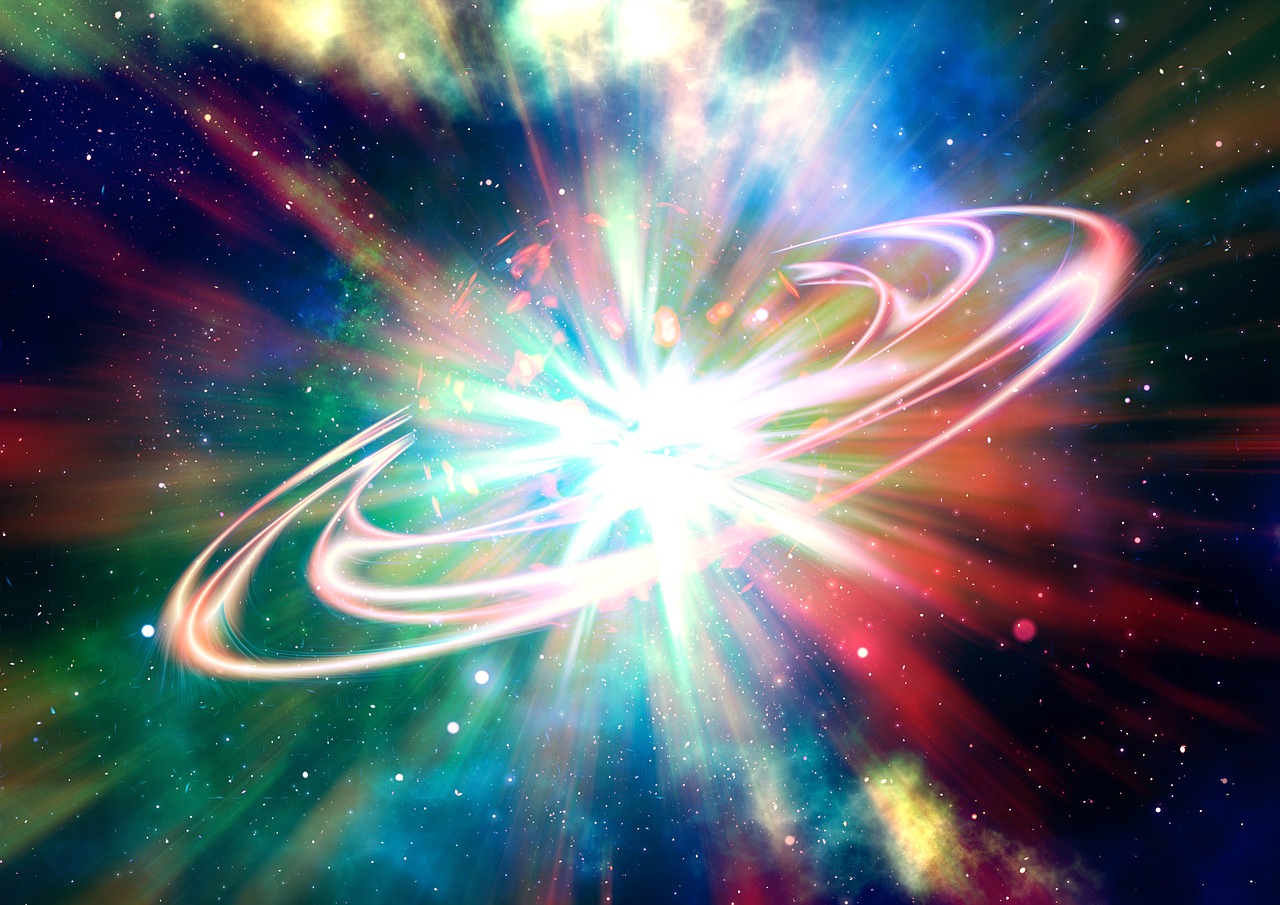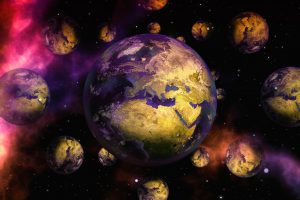In your blog post titled “The Kalam Cosmological Argument”, you made the statement: “We can infer logically that the cause must have certain attributes given the nature of the origin of the universe. For example, since the cause brought space into existence, it cannot be spacial. Since in order to be spacial, it would have to exist inside of space. But we know that space didn’t exist until The Big Bang. So the cause must transcend space (i.e be spaceless). It must be timeless for the same reason. No time until The Big Bang, so it cannot be inside of time. It cannot be inside of the thing that it’s bringing into existence. It must be immaterial since we know it’s spaceless. Since material objects have mass and therefore occupy spacial dimensions if there are no spacial dimensions until The Big Bang, if the cause were material, it wouldn’t be able to exist.”
I’ve heard many other philosophers make similar statements, and I’ve always agreed and thought this was obvious. However, after pondering this point harder, it now seems to me that one making statements such as the one above I quoted are making an important assumption: The universe is, indeed, all of space-time reality.
If one avoids making such an assumption, it no longer seems impossible (at least logical speaking) that the cause of the universe could be composed of matter. It seems that a proponent of the KCA must presuppose that the universe is all of space-time reality. While I don’t exactly think this is an unwarranted assumption, it still seems like an assumption nonetheless. I’d like to be clear here that I’m not arguing for any specific model like the multi-verse, or some quantum vacuum. What I’m asking is why would it not at least be possible that the cause of our universe is materialistic? If your response is that it is possible, would that not undermine the purpose of the KCA?
I would certainly appreciate any insight you can provide relating to my confusion.
Kind regards,
Christian
——————————————————————————————–
 Your question is a very important one regarding the conceptual analysis of The Kalam Cosmological Argument, Christian. In fact, the weight of the evidence is such that this is the approach of contemporary atheistic scientists and philosophers take when trying to avoid the conclusion that our world was brought into being by a Creator. If there was no absolute beginning of all physical reality, then it would be false that we have an ex nihilo miracle caused by a personal, timeless, spaceless, immaterial mind.
Your question is a very important one regarding the conceptual analysis of The Kalam Cosmological Argument, Christian. In fact, the weight of the evidence is such that this is the approach of contemporary atheistic scientists and philosophers take when trying to avoid the conclusion that our world was brought into being by a Creator. If there was no absolute beginning of all physical reality, then it would be false that we have an ex nihilo miracle caused by a personal, timeless, spaceless, immaterial mind.
So, I think you’re right in saying that the positive arguments for the cause’s attributes only work on the assumption that there is an ultimate beginning of everything. Now, the real question becomes then; how do we know The Big Bang really is the ultimate beginning of all reality?
First of all, I don’t think we need to prove that the cosmic explosion we call “The Big Bang” really is the ultimate origin. One could concede the models atheistic scientists propose like a multi-verse model, or a quantum vacuum model, or even the wild computer-simulation-run-by-aliens theory, all of which would make The Big Bang only a relative beginning. The important thing for the KCA isn’t whether The Big Bang is the ultimate origin, but rather whether or not there IS an ultimate origin at some point. The problem with multi-verse proposals, quantum vacuum proposals, and even the alien simulation theory is that they would, at best, kick the problem upstairs.
Now, I know you said you weren’t pushing for any particular model, but I think it’s important to show that no attempt currently on the table to subvert the absolute beginning of everything succeeds. And I shall do that in just a moment. To your question, you asked “What I’m asking is why would it not at least be possible that the cause of our universe is materialistic? If your response is that it is possible, would that not undermine the purpose of the KCA?” It depends on what you mean by “possible”. If you mean that it’s logically possible, then I might say yes. If you mean ontologically possible, then no. Moreover, I noticed you used the phrase “Our universe” I would say yes it is both logically possible and ontologically possible that “our universe” could have a temporal, spatial, material cause. But, again, what about that cause? To sweep away the validity of the conceptual analysis, one must get rid of an ultimate beginning altogether, and none of the options currently on the table can do that. They simply push God upstairs rather than eliminating Him altogether.
Let’s consider just two examples on both ends of the spectrum.
The Mother Universe
A model developed in the 1970s that is popularly called “The Mother Universe Theory” or “The Bubble Universes Model” says that there is a mother vacuum which spawns all sorts of “baby” universes in its “womb”. The mother universe is said to be static and eternal. It’s just the babies that have a beginning. This model has various serious problems. You see, at any point in the quantum vacuum, there is a non-zero probability that a universe would form at that point by a quantum fluctuation, but given infinite past time, universes will have come into being in all places in the quantum vacuum because given any non-zero probability and enough time, eventually that probability will be actualized. In that case, by now, all of those universes will have gotten so big that they would all fill the entire vacuum and collide with one another, join together, and form a massive universe that gives off the appearance of an infinitely old, infinitely large universe…in contradiction to the powerful scientific evidence that tells us that we live in a universe of finite size and age. So as you can see, it’s not enough for these bubble universes to expand in the unchanging mother universe. In order to avoid having the appearance of an infinitely old, infinitely large universe, the mother universe has to be increasing in size as well. But if the mother universe were constantly expanding, then the Borde-Guth-Vilenkin theorem would apply to it, and that means the mother universe had a beginning to its existence and would require a transcendent cause.
Now some of our readers may be wondering at this point what The Borde-Guth-Vilenkin theorem is. The Borde-Guth-Vilenkin theorem is a theorem published by Arvin Borde, Alan Guth, and Alexander Vilenkin. It says that any universe which has been constantly expanding in the past cannot be infinitely old but must have come into being at some point in the past. The Borde-Guth-Vilenkin theorem implies that even a mother universe producing many baby universes must have a beginning to its existence.
Vilenkin writes on page 176 of his book Many Worlds in One:
“It is said that an argument is what convinces reasonable men and
a proof is what it takes to convince even an unreasonable man.
With the proof now in place, cosmologists can no longer hide
behind the possibility of a past-eternal universe. There is no escape;
they have to face the problem of a cosmic beginning.”1
Addtionally, The Mother Universe problem falls under the same issues of the absurdities of infinities which I argued in “The Kalam Cosmological Argument” lead me to the conclusion that this universe had a beginning. Physicist John M. Kinson explains that: “P1. If Atheism is true, the Universe must have always existed. (If so, an atheist could argue that there is no need for God to create the universe.) P2. The Big-Bang shows that the Universe did NOT always exist. P3. Therefore, atheism is False. P4. To avoid this conclusion (that atheism is false, and God exists), many leading atheists prefer the conjecture that our universe was birthed by a mother-universe. So, in a sense, our universe was created by a mother-universe. P5. So, what created the mother-universe? One atheist conjecture is that the mother universe always existed. P6. However, this means that the mother universe must have crossed an infinite number of moments (of time) to get to the instant when it gave birth to our universe. P7. However, is it impossible to cross an infinity of time-moments by crossing (or counting) through them one by one (sequentially). No matter how long you count, you can never cross infinity. P7. However, is it impossible to cross an infinity of time-moments by crossing (or counting) through them one by one (sequentially). No matter how long you count, you can never cross infinity. P8. Therefore, the grandmother -universe cannot be infinitely old. P9. Therefore, the grandmother universe was created a finite-time period ago. P10. This reasoning shows that the grandmother -universe did NOT always exist. P11. Therefore, the Superset-Universe (defined as including grandmother-universe, mother-universe and our universe) did NOT always exist. P12. Therefore, atheism is False (similar to P3 above). C1. Therefore, Atheism is False. C2. Therefore, there is a God (who created the universe, or the mother universe, or the grand-mother universe).”2
In conclusion, the multiverse can’t be the escape hatch from God that the atheist wants it to be. Even if I were to concede the point to the atheist that a mother universe actually exists, it must have had a beginning, and hence, a transcendent causal agent that brought it into being.
The Alien Computer Simulation Theory
Neil DeGrasse Tyson mentioned this idea in passing when talking about The Big Bang in his book Astrophysics For People In A Hurry. He wrote “Or what if everything we know and love were just a computer simulation rendered for entertainment by a superintelligent alien species?”3
The problem with the idea that the universe is a simulation run by aliens is this: even if it was conceded, it wouldn’t get rid of an ultimate beginning. At best, it would account for our universe’s beginning.
Why do I say that? Well, these aliens had to be born, grow up, go to college and learn computer skills, in order to be able to create our universe. right? That sequence of events presupposes before-and-after relationships. Before-and-after relationships logically entails the passage of time. Therefore, the universe in which our superintelligent alien creators live in is a universe in which time passes. If it’s impossible to traverse an infinite number of moments, then that means that the universe that our alien creators live in must have had a beginning as well! Now, one could say “Maybe that universe is a simulation run by even superior superintelligent aliens. We’re living in a simulation inside of a simulation”. Again, these aliens had to be born, grow up, and learn computer skills before they could actualize the simulation which produced our simulation. That universe had to have a beginning. This problem throws you into an infinite regress of simulations begetting simulations. Since infinite regresses are impossible to cross (i.e our simulation never would have come about), that implies that there must be an ultimate beginning somewhere in the line of simulations. Again, God rears His holy head!
Conclusion
These two attempts to subvert the ultimate beginning of reality aren’t the only ones on the table, but they are currently the most popular. The latter, because it’s so wild and titillates the inner sci-fi nerds in us. But even if they were conceded, they would only go so far to show that the ultimate beginning isn’t at The Big Bang, but farther back.
So, to come full circle to your original question, while I think it’s ontologically possible for the cause of our universe to be spatial, temporal, and material, I don’t think it’s ontologically possible that the cause of the ultimate beginning of everything is, and that’s all that’s needed for The Kalam Cosmological Argument to be successful.
————————————————————————–
NOTES
1: Alexander Vilenkin, Many Words in One: The Search for Other Universes, (New York: Hill and Wang, 2006), p. 176.
2: John M. Kinson, “God and The Multiverse: An Ex-Atheist Scientist Investigates The Evidence”, Amazon Digital Services, Pages 215-216
3: deGrasse Tyson, Neil. Astrophysics for People in a Hurry (Kindle Locations 170-171). W. W. Norton & Company. Kindle Edition.
If you have any questions about Christian theology or apologetics, send Mr. Minton an E-mail at CerebralFaith@Gmail.com. It doesn’t matter whether you’re a Christian or Non-Christian, whether your question is about doubts you’re having or about something you read in The Bible that confused you. Send your question in, whatever it may be, and Mr. Minton will respond in a blog post just like this one.







Hi Evan, thanks for your response. This helped clarify most of my confusion. I just have a quick question. I know this may sound strange, but humor me for a moment. Let's suppose that someone said the cause of the universe was a 'block' of matter. Now, I understand a this 'block' would have no causal power, but for the sake of question, assume it would. Why could this not have been the *ultimate* cause of the universe? I understand the specific criticisms with the theories you covered, but I suppose I'm looking for general answer to why *anything at all materialistic* could not have been the ultimate cause of the universe, including some collection of atoms (once again, please assume such a group of atoms has causal power)
I thought about this a bit, and I suppose your response would perhaps be that an infinite series of events would have had to been crossed by this material 'block', for it to have existed eternally and necessarily. If so, I'm not exactly sure what would be meant by this. Perhaps you could elaborate? Once more, thanks for taking the time to answer my questions.
Ah, well, once you conclude that there was an ULTIMATE beginning to all physical reality, then its actually pretty easy to see why the cause couldn't be a material type of thing. For any material thing to exist, there has to be spatial dimensions for it to exist in. If there's no such thing as space, there can be no such thing as matter. Since space didn't exist until some point in the past, then the cause of the ultimate beginning of everything wouldn't have any spatial dimensions in which to exist. Now, if the cause of the universe cannot be material, the only alternative is that it is immaterial.
Now, as I pointed out in chapter 1 of Inference To The One True God ((I can't recall if I said this in the blog post "The Kalam Cosmological Argument")), the immateriality of the cause entails that the cause is a mind with free agency. According to philosophers, two things could fall into category of the immaterial; abstract objects like numbers and unembodied minds. Abstract objects have no causal power. The number 7, for example, can emit no causal power on anything. Since abstract objects are causally impotent. That rules them out as what kind of immaterial thing the cause of the universe is. Through abductive reasoning then, the best explanation is that the cause is an unembodied mind.
Given that we have good grounds for believing that space had an absolute origin (either at The Big Bang, or the big bang of the mother universe, grandmother universe, or what have you), we also have good grounds for affirming that the universe's cause had to be an immaterial, non-spatial mind.
I was a bit confusing with my words Evan. My apologies. By ultimate cause, I *didn't* mean to imply that I was stating *all of space-time reality had an ultimate beginning*. I was asking why couldn't the *uncaused, first cause* of the everything – what the Greeks called the 'prime mover' – be *made of matter*. What is it exactly about matter, generally speaking, that would exclude it from being the *uncaused, first cause* of the universe? Would a proper response perhaps have something to do with the impossibility of an infinite?
The reason why the price moved couldn't be physical or material is, as I said, that it transcends all physical space. Matter has mass and as such, it takes up space. If there's no spatial dimension s in existence (as was the case prior to the ultimate beginning), then there is literally no room for a material cause to exist.
Only if you posit space before the beginning of the universe (as models like the mother universe theory do) can you have a material cause of the big bang. But, again, all such models eventually have to be traced to an ultimate beginning of all space-time realms, and therefore we're back to a non-physical prime mover.
*prime mover, not price moved. Sorry. Autocorrect.
Ah, okay! I finally get what you're saying. That makes sense! I guess I just wasn't connecting the fact that matter needs space to exist. And if one does try to posit space existed before the universe, the cause would be subject to the some of the same criticisms as current models, such as the impossibility of crossing an infinite amount of time, the non-zero probability of a universe spawning, etc. Thanks for your help Evan in clearing up my confusion, I really do appreciate it.
You're welcome. I'm glad I could help. ☺